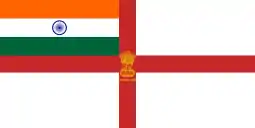Durg-class corvette
The Durg-class corvettes of the Indian Navy were customized variants of the Soviet Navy Nanuchka-class corvettes. Three vessels of this class served in the Indian Navy, where they formed the 21st Missile Vessel Squadron (K21).[1]
| Class overview | |
|---|---|
| Name: | Durg class |
| Operators: |
|
| Succeeded by: | Veer class |
| Planned: | 3 |
| Completed: | 3 |
| Retired: | 3 |
| General characteristics | |
| Type: | Corvette |
| Displacement: | ~570t standard; 670t full load |
| Length: | 59 m (194 ft) |
| Beam: | 12.5 m (41 ft) |
| Draught: | 2.5 m (8 ft 2 in) |
| Speed: | 32 knots (59 km/h; 37 mph) |
| Complement: | 42 (incl 7 officers)[1] |
Durg-class vessels take their names from famous historical forts in India. The Durg class was primarily intended for coastal patrol and defence. They were the first class of vessels in the Indian Navy to primarily rely on surface-to-air missiles and anti-ship missiles for defence.
Design
The Durg class is also known as the Nanuchka II class. Some design improvements made for the Durg class were incorporated into the Nanuchka III class, commissioned into the Soviet Navy in the 1980s.
Ships of the class
| Name | Pennant | Commissioned | Decommissioned | Status |
|---|---|---|---|---|
| INS Vijaydurg | K71 | 25 December 1976 | 30 September 2002 | |
| INS Sindhudurg | K72 | 29 May 1977 | 24 September 2004 | |
| INS Hosdurg | K73 | 15 January 1978 | 5 June 1999 | Sunk in a Sea Eagle AShM test |
References
- "NAVY - Nanuchka II Class (Durg)". Bharat-Rakshak.com. 30 October 2008. Retrieved 24 December 2014.
This article is issued from Wikipedia. The text is licensed under Creative Commons - Attribution - Sharealike. Additional terms may apply for the media files.
